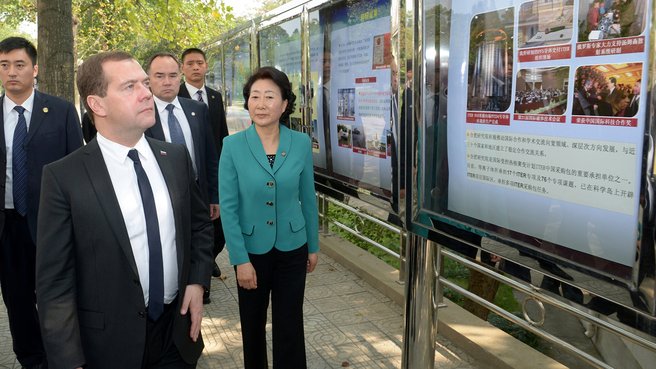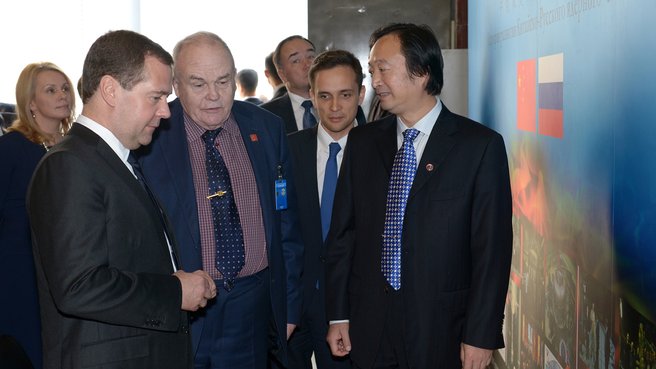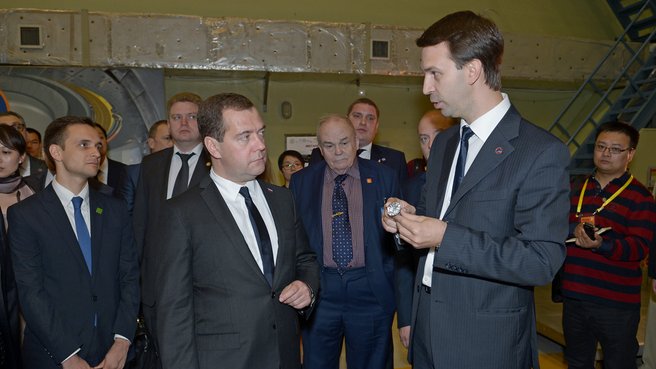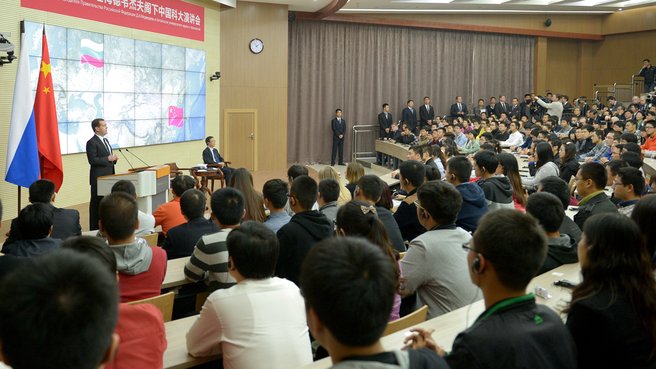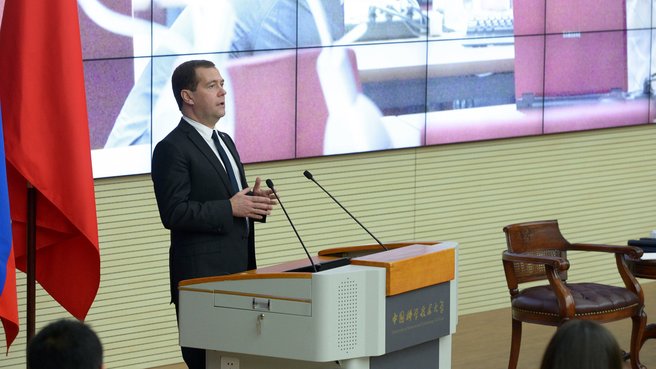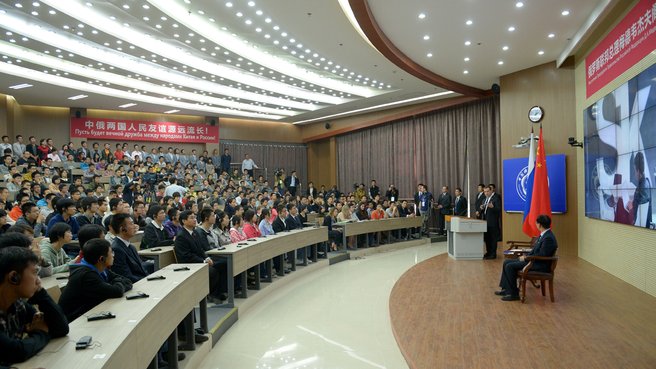The Prime Minister learnt of the work of the Institute of Plasma Physics and spoke before the students and professors of the University of Science and Technology of China.
Meeting with students and faculty at the Chinese University of Science and Technology
The Prime Minister looked at displays showing the structure and activity of the Institute of Plasma Physics.
The Prime Minister was shown the EAST superconducting Tokamak (Toroidal Chamber with Magnetic Coils) system. President of the National Research Centre Kurchatov Institute Yevgeny Velikhov, Deputy Director for Research at the Dubna Institute for Nuclear Research Grigory Trubnikov, and Director of the Institute of Plasma Physics Li Jiangang informed Mr Medvedev about its work.
Grigory Trubnikov asked the Prime Minister to provide political support for a mega-science project, the world-class Nuclotron-Based Ion Collider Facility (NICA), currently being developed at the Dubna Institute for Nuclear Research near Moscow. The Dubna Institute is an international inter-governmental organisation uniting 18 member-countries.
The project aims to conduct fundamental research which cannot be undertaken at other particle accelerator centres worldwide. This research primarily studies super-dense nuclear matter which existed during the early stages of the evolution of the Universe, and to accomplish a wide range of innovative and applied objectives.
Chinese institutes are among those cooperating on the NICA project. The sides are studying the possibility of launching a new Russian-Chinese cryogenetics research programme at the Dubna Institute for Nuclear Research. The programme would also deal with new superconducting materials and magnetic elements for implementing the NICA Complex and EAST mega-science projects.
Dmitry Medvedev promised to support the project and to instruct the Government and Rosatom State Nuclear Corporation accordingly.
***
Dmitry Medvedev meets with students and faculty at the University of Science and Technology of China
Transcript:
Dmitry Medvedev: Mr Rector, ladies and gentlemen, colleagues. I am very happy to be at your university, and I’d like to use this occasion to congratulate its faculty, students and alumni on the 55th anniversary which you marked [in September] this year. This is a nice, round date.
Mr Rector has told you about my pursuits. In fact, before accepting a government job I spent a long time teaching at the St. Petersburg University, and it probably was one of the most interesting periods in my life. Unfortunately, it is over. I miss the students, the lectures and the seminars, all of which was very interesting. I can’t lecture at your university, but if anyone is interested in law I am willing to talk about it.
I am impressed by what I have seen here. What you do at this university is the result of hard work of generations of lecturers and students. This has made your university a respected centre of research and innovation technology which should be proud of its achievements. I have seen on the stands here what you have done, the reference index of your university and its place in the Top 100 Universities of China rating. This is great, and I am pleased to note that all of this has been done over a relatively short period of time compared to many global centres of learning, European, US and Russian universities, which worked towards this goal for centuries. You have achieved it in barely 55 years, which is not long.
The university’s slogan is “The union of science, education and innovations.” Mr Rector has told me that you have a school for talented young people, which is very good, because a university which identifies talented children and nurtures them into its students usually becomes a major success. This is one of your strengths. A generation of new professionals, scientists and researchers is being trained here.
I’d like to share my impressions and my view on the development of science and innovation in Russia and the processes that are underway there, which are, of course, in line with global processes.
All of us see the world is changing very rapidly and faces major challenges. The shape of the global economy is changing, as the economic system which you are creating differs from the one that we are developing in Russia. The system of international interaction is changing, and competition is growing. But the most important thing is that long past is the time when countries matched strength against military strength and won domination only through the use of weapons. We all hope that the time is past for this. In these new conditions, competition is waged in the sphere of technology and economy, and each country is trying to find its own model of development. We in Russia are searching for it too.
It is very important for the country’s development and national leadership strategies to rely not only on modern democratic institutions ruled by law, but also on the contribution of all citizens to state governance and to the creation of new rules of the game in the economy. This is why technological innovations are so important. The potential of innovations is so large that it can enhance the efficiency of the country as a whole and help it to stand up against global threats such as hunger, epidemics and environmental pollution. The world is an interconnected system where we all depend on each other, live together and develop together, and cooperate with each other. The history of your university serves as an example of this, as Mr Rector has said, because this is how your university has always worked. Victory goes to those who join forces to use the accumulated global knowledge and ideas and effectively adapt them to conditions in their city, province, region or country. This is also Russia’s strategy. We are speaking about open innovations, and hence our strategy is not based on secretiveness, isolationism or protectionism, but on stronger international integration in research and on market openness.
Another thing I’d like to highlight is that our innovation policy is not based on support for separate projects, but on uniting them into something whole, an integrated system (at least this is what we have been striving towards, though we do not always succeed). It is obvious that to create a modern innovative economy you need a system of incentives. We should incentivise scientists and universities, and also encourage people to apply new skills in everyday life.
It is obvious that different business models should be used because modern science is based not only on budget investments but also on the potential money derived from the commercialisation of research and application of R&D. And promoting the development of innovations implies, as we see it, that the state institutions themselves should be helped to become more open and better adapted to public relations. This effective feedback link between society and the government, and the encouragement of public efforts and public self-organisation is of much importance for us. This is why my Government even has a special division called the Open Government.
Over the recent years, the People’s Republic of China has made a powerful leap forward in hi-tech area. I know that there are over 30 major science parks in this country, while a number of hi-tech brands like Lenovo or Huawei have gained global status. This is great. My country has long been distinguished by a high level of fundamental research – we do our best to support fundamental science – and it has every chance for developing as one of similar innovation centres. There is a long history of cooperation between our two countries in this field, as Mr Rector has just said. Your Rector, Mr Hou Jianguo, began his research career at an electronic microscope laboratory in Moscow, as your Deputy Rector has just said. Mr Ye Xiang Dong was a student at the Moscow University’s Department of Mechanics and Mathematics. Why am I speaking about this? I think this is very important precisely for subsequent scientific cooperation.
Now let me say a few words about certain concrete things that my country has been concerned with. We have started technological modernisation of the economy in a bid to transition from the so-called raw-material model to an innovative model. Why is it difficult for us? As you know, Russia is a very large country. We have considerable reserves of raw materials, hydrocarbons and energy, and there is a great temptation to make money solely by selling these resources, which, of course, fetch a lot of cash. We maintain full-blown trade exchanges with the People’s Republic of China, among others, including vast energy trade. But if we focus on this area alone, there will be no progress in others, although, let us be frank, the energy sector can generate high technologies as well. This is why we seek to promote a new economy.
Not so long ago, I suggested five priorities for us to focus on – medicine, energy efficiency, nuclear technology, computer technology and space technology. This does not mean that we are neglecting other areas. But these five are our main priorities because, first, they are really very important. Second, we have a certain technological reserve and made significant breakthroughs in fundamental research. The fact that we are concentrating on these vectors keeps us from dissipating our energies and helps to achieve definite results. We have launched large-scale innovation infrastructure projects and we support regions active in innovation. We seek to support active regions and cities, something that you do too in Hefei and the Anhui Province. It is a very advanced region in this sense, distinguished by a special focus on innovations.
We are creating new centres that engage in cooperation, including internationally. One of these is Skolkovo near Moscow. This project integrates interesting ideas, unconventionally-thinking – as I hope – researchers, and different technological schools. We are on friendly terms with a number of global business giants. Siemens, Cisco, Microsoft, Samsung and many others have opened their offices at Skolkovo. As I know, you are also active in this field. The moment I saw who you were working with, I knew that we were doing very similar things. These companies have established their R&D centres at Skolkovo, which employ both Russian and foreign scientists. There is nothing new in this; the majority of countries, including yours, work on the same principle.
I would like to say again that our government and the academic community consider cooperation in developing innovative technologies to be their absolute priority. The international forum Open Innovations, to be held in Moscow for the second time at the end of October, will be attended by leading experts and leaders in the development of innovative products. Of course, we would be happy to see the representatives of your university at this forum, should you wish to come – you are welcome!
Yesterday my colleague, the Premier of China’s State Council Li Keqiang, and I agreed that next year China would partner with us to host this forum and your compatriot, the Premier of the State Council, would attend the forum. I’m sure he will bring an impressive delegation with him, including representatives of your university, and that you will present your most interesting projects.
I would like to emphasise again that the modern innovative system depends on research universities for best practices, including the best business practices. I know that your university plans to enter into cooperation with our leading technical universities, including one of the best technical universities, the Bauman Moscow State Technical University. We are all for this idea, it will be great if you make this happen. In December 2012, the head of the Government of the People’s Republic of China and I approved the action plan, which specified the targets of Russian-Chinese cooperation. Established five years ago, the Russian-Chinese Intergovernmental Commission on Humanitarian Cooperation must be given credit for the progress made in implementing the joint baccalaureate preparation programme, and the expansion of direct contacts between our universities. I would like to repeat that I believe this to be very important. I have worked at the university for a long time and I can say that direct contacts are absolutely invaluable, even in the age of the internet, when you can easily visit the website of any university and if you know English or Russian, you can find out how things stand there. No substitute exists for direct contacts between students or between students and professors. It is all very important, and so we are set to develop cooperation in this area as well.
We have created the Association of Specialised Universities, and yesterday we signed the relevant memorandum at our intergovernmental meeting in Beijing. We already have the Association of Technical Universities of the Russian Far East, Siberia and the Northeast of China. We are enthusiastically maintaining contacts between our universities. We are also establishing new universities there. For example, recently we have created a major federal university in the Far East, so I hope that in the future we can create associations of schools of economics or teacher training universities, or of any other type of universities. We are looking forward to developing our relations in all areas.
Today, 25,000 Chinese students are being educated at our universities. This sounds like a good figure, but it could be higher. In China there are 15,000 Russian students, which, on the face of it, is not bad, but still there are not as many of them as we would like to have. Therefore, we have a new project underway, which aims to have at least 100,000 students participating in student exchange programmes every year. This will be a significant improvement. If you have an inquisitive mind – and all students have an inquisitive mind and keep up with various events – you surely noticed that our contacts in recent years have become much more robust and, indeed, we have become strategic partners.
In 2006 and 2007 we had the Year of Russia in China and the Year of China in Russia. Then there was the Year of the Russian language in China and the Year of the Chinese language in Russia, as well as years of tourism (the Year of Chinese Tourism is drawing to a close). In 2014 and 2015, we will see reciprocal years of youth exchanges. I very much hope that many of those present will visit Russia during this period when particularly favourable conditions will be created for young people to visit the two countries, their cities and territories. In order to travel and communicate you, of course, have to know the language. So, our Russky Mir (Russian World) Fund has been opening Russian language centres and rooms at Chinese higher education institutions, and 20 Confucius Institutes and classes have been established in Russia.
There is one more thing I would like to tell you. It is not directly linked with the topic of my speech, but it is very important. Yesterday, during the meeting with President Xi Jinping and Premier Li Keqiang, we discussed our recent struggles with the biggest flood in a century on the Amur, Sungari and some other rivers. It was a large-scale disaster. I was in touch with Li Keqiang over the phone from the moment the flood struck. I think this was the right thing to do: the Russian and Chinese rescue workers informed each other every day on the situation and on what was being done to combat the flood. This is real friendship. I would like to thank all those who exposed themselves to danger, who helped the victims, those who responded to our call. I see a wonderful slogan here: “Long live the eternal friendship between the peoples of China and Russia.” Friendship is not only about scientific cooperation, great as it is, friendship is also about providing help in difficult situations.
I would like to repeat: today we enjoy a unique level of partnership, and it is no less important that we have good personal relationships. I am sure that those who have not been to Russia, but have seen pictures of our country on social media, on the internet, many of them would like to visit Russia because we are a big and beautiful country. I would like to show you some photos I have taken myself (shows photographs)... And these are photos taken by others. Of course, it’s best to see everything with your own eyes... These are my photos again. You see, Moscow is a densely populated city, comparable to the biggest megalopolises in China. Moscow has an estimated 12 to 15 million people, and I have to get to work by helicopter rather than drive in order not to obstruct traffic. This is one of the shots I took on my way to work.
This is harvesting. Russia is an agrarian country, you know that we have many fields, we have large tracts of plough land. Incidentally, we also enjoy close cooperation on food and agriculture. This photo shows this year’s harvesting.
These are just some beautiful spots in the north of our country.
This is the Russian winter.
This is the Tobolsk Kremlin, another famous place.
This is the Black Sea.
These are mountains. This is Sochi where the Olympic Games will be held soon.
If you have any questions – a reasonable number because I’m not yet finished – I would be glad to answer them.
Hou Jianguo ( Rector of the University of Science and Technology in Hefei) (via interpreter): Thank you very much for your wonderful speech, I hope the students and the professors have some questions. If you want to ask a question raise your hand.
Question: Good afternoon, Mr Prime Minister. Can I speak in Russian?
Dmitry Medvedev: Great! I’d be delighted.
Question: Thank you very much. On behalf of all the students and teachers present I cordially thank you for your interesting and wonderful speech. With your permission I would like to ask you some questions. What do you think about the future cooperation between Russia and China in the field of science and technology? Our university and Bauman University have recently signed a cooperation agreement. How do you see the future of our cooperation with Russian universities? Perhaps you could give us some useful tips. Thank you very much.
Dmitry Medvedev: Thank you. As a matter of fact one of my aims today was to tell you how I see the future of this cooperation. I think the prospects are very diverse because your university was launched as a project in which my country had played a certain role. I am glad that we are together again and that we are doing some joint research. Our universities are working with your university, the best Chinese university in the field of science and technology – I am referring to our Bauman University… The pluses are obvious. Science has no borders. You cannot do research today just sitting in your office. Some kinds of research call for huge and very sophisticated premises and equipment. I have just looked at your Tokamak. It’s super. A major, serious joint project with my country. So, if we work together, if we pool our scientific potentials, and if we back it up with political decisions – and many big projects cannot get started without political decisions – we will achieve phenomenal success in science. If we achieve success in science we will make our life better, people will benefit, we will get new sources of energy, new technologies, we will get new medications, we will get new means of transport. I think this is the most important thing.
As for tips, I can give you only one valuable piece of advice: study as hard as you can.
Hou Jianguo: What would you advise us to do in order to become such a university?
Dmitry Medvedev: As to what your university has to do to become a world-class university, I can only say that you are already a world-class university. You are the flagship, so I think everything is fine, just look at your rankings.
I think as students you can establish cooperation with anyone, and not just cooperation but friendship. I am glad that there are good friendly relations between our countries and our educational institutions. I do not have to tell you what scientific work is like. It is very seldom that people who do some work together hate rather than like each other. On the contrary, as a rule everything is based on friendship, teamwork, on mutual understanding. If you communicate with somebody, then you are fine, you have a personal relationship, so I think today we can work with various countries, and that is good.
As I just said, science has no borders, and education has no borders. That is why I would like to repeat that it is very important that people from different countries teach at different universities. You have many visiting professors, and I think that is great, because you can, of course, listen to what a professor is saying on the screen or watch him on the internet, but direct contact is very important. I think in that sense we can establish cooperation with any university, and so can you.
Question: When the state invests in science, it expects an economic effect, but the effect is not always immediate. Do you face the same problem and how do you tackle it? Please, share with us.
Dmitry Medvedev: I can assure you we have the same problem, it is not only a problem for the Chinese Government, it is a worldwide problem. I have to admit though that our countries only recently began to reform science and to try to commercialise projects that are being implemented in science. You can take my word for it, commercialisation is not yet among the strengths of Russian science and Russian business. I think you are doing even better on that score than our country. We are still learning.
As for the effectiveness of investing in science, we all know that these things are relative. When you invest money in applied science you want the result, that is, the opportunity to use something, to sell and to make money. That is normal. But when we talk about investments in fundamental science, the effect may be very low, there may be no effect at all over decades and more, and then at some point a unique discovery triggers a revolution in production. It has happened many times over the course of human history, so don’t complain about low effectiveness just yet, because it may turn out just the opposite.
Question: How do you assess the prospects of further cooperation between China and Russia?
Dmitry Medvedev: The prospects are very good, and we were discussing them all day yesterday. Many new agreements have been signed. Speaking about our plans, they are as follows: we will continue cooperating with the People’s Republic of China and with Chinese companies – the biggest companies and perhaps medium-sized companies – on energy issues. I mean all sectors, including gas… We agreed yesterday on how we will work, according to what rules gas will be supplied via pipeline toward the east. That is very good. Agreements were signed yesterday on increased oil supplies to the People’s Republic of China between Rosneft and CNCP and Sinopec. We are talking about huge amounts, tens of millions and perhaps a hundred million tonnes and sums that run into the tens of billions of dollars.
We are cooperating in the field of nuclear energy. We are building the Tien-Wang nuclear power plant together: two units have been built and two more are in the works, so our energy cooperation is advanced, even in such seemingly simple areas as coal supplies. We are increasing these supplies to the People’s Republic of China because you have a very big market.
Still on the subject of prospects. What should be the focus? I think it should be high-tech cooperation. Yes, we will supply raw materials, we have lots of them, we will supply hydrocarbons – that is absolutely normal, but we must also cooperate in the field of high technology, and that means creating new products, chemistry, products with higher added value. Incidentally, yesterday we discussed and signed documents on the joint construction of the Tianjin oil refinery, which will have cutting-edge technologies and a very high capacity. I think you as students and future specialists and scientists should pay attention to high technology as a sphere of our cooperation in the energy field.
Hou Jianguo: Today you have learned more about Russia, our friendship with Russia and we all feel an even greater desire to strengthen exchanges and scientific cooperation with Russia. Once again let us give a round of applause and thank Dmitry Medvedev for his speech.
Dmitry Medvedev: Thank you very much. (Also says ‘thank you’ in Chinese).
Hou Jianguo: We would also like to present this certificate to Dmitry Medvedev, making him an honorary professor of our university. We hope that the Prime Minister will be a friend of our university forever. (Hands the certificate of honorary professorship to Dmitry Medvedev).
Dmitry Medvedev: Since you have awarded me the title of honoris causa professor, I have to deliver another lecture and ask you to build up your patience for another hour and a half. Seriously, though, I would gladly do this next time. Once again, thank you very much.
